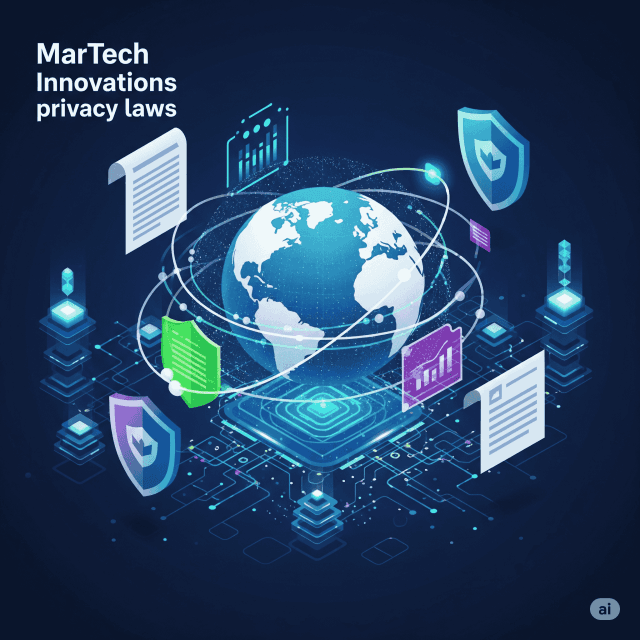In our increasingly digital world, the dynamics of marketing technology (MarTech) are rapidly evolving. The intertwining of sophisticated technologies and consumer data presents both opportunities and challenges, particularly given the global shift toward stricter data privacy regulations. As these laws aim to protect consumer rights and personal information, MarTech companies find themselves at a crossroads, necessitating innovative strategies to ensure compliance while also meeting the demands of modern marketing.
Understanding the Privacy Landscape
The past few years have witnessed a wave of data privacy legislation across the globe. From the General Data Protection Regulation (GDPR) in the European Union to the California Consumer Privacy Act (CCPA) in the United States, these laws impose stringent requirements on how businesses collect, store, and utilize consumer data. Countries like Brazil, Canada, and various others are also implementing or updating their data protection frameworks, contributing to a complex regulatory environment.
For marketers, this complexity translates into a need for transparency and trust. Customers are increasingly demanding not just personalized experiences but also assurance that their data is handled responsibly. This shift is prompting advancements in MarTech solutions designed to enhance compliance while still driving marketing effectiveness.
Innovations Driving Compliance
1. Privacy-Centric Data Management Platforms
MarTech companies are investing in platforms that prioritize privacy from the ground up. These Data Management Platforms (DMPs) support compliant data collection and segmentation practices, allowing marketers to leverage first-party data—information directly collected from users—more effectively. By using consent management tools, these platforms ensure that user agreements are not only adhered to but also transparently communicated, fostering greater trust.
2. Enhanced Consent Management Solutions
Innovative consent management solutions are essential in navigating the new privacy landscape. These tools empower consumers to manage their preferences regarding data sharing. By integrating well-designed opt-in procedures and clear privacy policies, companies can maintain user consent records efficiently, thus ensuring compliance with regulations like GDPR and CCPA.
3. AI and Machine Learning for Compliance
Artificial intelligence (AI) and machine learning (ML) are becoming pivotal in monitoring and managing compliance. These technologies can analyze vast amounts of data to identify potential risks and violations of data privacy laws. Automated alerts and predictive analytics can help businesses stay ahead of regulatory requirements, allowing them to adapt their strategies in real time.
4. Privacy-First Marketing Strategies
Marketers are also adopting privacy-first strategies that emphasize ethical data use. For instance, instead of relying heavily on third-party cookies, brands are exploring contextual advertising and alternative targeting methods that respect user privacy. These strategies not only comply with regulations but also align with consumer preferences for less intrusive marketing practices.
5. Blockchain for Data Transparency
Some innovators are exploring blockchain technology to enhance transparency in data transactions. By providing an immutable ledger of how data is collected, used, and shared, blockchain can help build consumer trust and facilitate compliance. This technology could revolutionize data sharing practices in ways that protect consumer identities while still allowing for useful analytics.
Navigating the Global Terrain
As companies expand their global reach, it’s vital to understand the nuances of different regulatory environments. This necessitates not just technical adaptations, but also a cultural understanding of consumer attitudes toward data. For example, while European consumers may prioritize stringent privacy, many in emerging markets may be more willing to trade data for personalized services—indicating a need for flexible, region-specific strategies.
1. Building a Global Compliance Framework
Brands must establish a comprehensive compliance framework adaptable to various international laws. This means not only staying informed about local regulations but also implementing internal policies that reflect overarching data protection principles.
2. Engaging in Continuous Education
As digital marketing evolves, so do privacy laws. Continuous education for marketing teams on compliance and ethical data practices is imperative. Regular training sessions can help ensure that all team members understand the importance of data privacy and their role in upholding those standards.
Conclusion
The MarTech landscape is in a state of flux, driven by the need to comply with evolving data privacy laws. Innovation is key in navigating this changing environment, with privacy-centric technologies paving the way for more ethical marketing practices. By embracing these innovations, marketers can not only comply with regulations but also build stronger, trust-based relationships with their customers. As we look to the future, the interplay between privacy and marketing will define the success of brands in a data-driven world.









